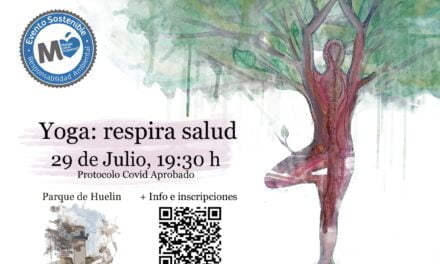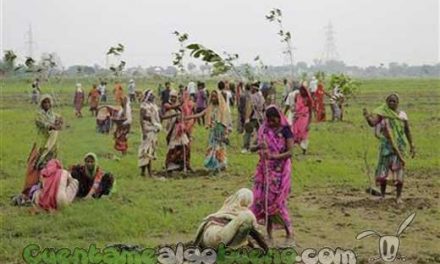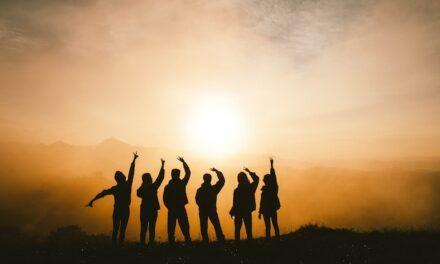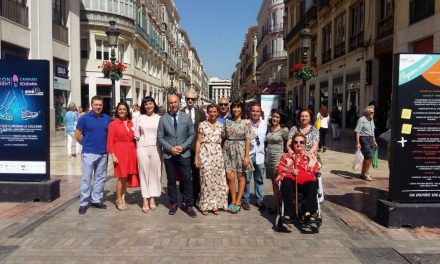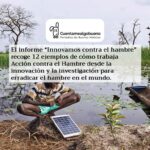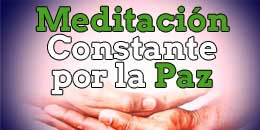La Carta de Málaga se convierte en el Documento de Referencia de la Nueva Economía e Innovación Social.
Fue leída en grupo por niños y adultos como colofón de la primera jornada del NESI Forum 2017.
Ayer tuvo lugar la lectura de la «Carta de Málaga por la Nueva Economía e Innovación Social» como colofón de la primera jornada del foro NESI 2017 que está celebrándose estos días en el Palacio de Ferias y Congresos de Málaga.

Presentamos el vídeo con la lectura grupal de la carta por niños y adultos que grabamos para los lectores de Cuentamealgobueno:
Este es el contenido íntegro de la carta (en inglés)
«The NESI Charter»
(The New Economy and Social Innovation Charter)
Preamble
A new paradigm is emerging. People around the world are living with a new consciousness and building a new economy. A new economy is not simply ‘the market’. It is a complex system embedded in social and ecological systems The new economy that the world needs is not just about technology, it is about values. It is one that moves from meeting wants, to first meeting needs; from consuming to living and caring; from individualism and competition towards democracy; from creating problems such as forced migration and climate change to solving them; from an extractive model towards a regenerative one that preserves harmony between human beings and the planet.
Today, aware that we share common goals and that we are stronger together, we propose greater co-operation and social innovation for the transition towards a new economic system that works within the ecologic planetary boundaries and is based on shared capabilities, social and economic justice as well as human rights.
Today, convened by the New Economy and Social Innovation forum (NESI), we affirm the following goal, values and strategies that will guide the co-creation of a new economy.
The goal of the new economy
The goal and purpose of the new economy will be to serve people and the planet.
The values of the new economy
To achieve this goal, we need a rights-and-values-led system where justice, solidarity, sustainability, equality, autonomy and collaboration are at its centre.
The ambition of the new economy
We dream of, and commit to co-creating:
- A new economy that satisfies human needs and is based on human rights.
- A new economy that preserves harmony between human beings and the planet.
- A new economy that ensures the fair redistribution of existing resources.
- A new economy that provides decent work and fair access to leisure for all.
- A new economy that allows all to flourish.
Our strategies to co-create a new economy
We commit to the co-creation of this new economy. A new values-and-rights-based economy, a better economic ecosystem that integrates the best proposals of models based on:
- Social purpose, such as social enterprises, economy for the common good, social and solidarity economy, B-Corps or banking on values;
- Ecological sustainability, such as agroecology, green, circular or blue economy;
- Collaboration openness and justice, such as collaborative economy or the commons.
- Re-Localisation, wherever appropriate, such as transition towns and other movements working to find a right balance between local and global.
All these models agree with internalising the goals and values of the new economy into each and every organisation, since embodying these is a precondition for successfully achieving the lofty goals here espoused. All these models and many others, are rethinking and reshaping concepts such as food, money, organisations, work, production and trade. For that reason,
We commit to co-creating a new economy
- A new economy where money is a means and banking and finance serve the people.
We commit to co-creating a new economy in which money is a means, never and end in itself. A new economy where money creation is under democratic scrutiny and people are educated and empowered to participate in the solution of problems such as out-of-control debt. A new economy, where consumers, private organisations and public institutions promote banking based on values and finance for the common good. A new economy where mechanisms of distribution and solidarity, such as philanthropy and the work of charities and NGOs, will not only fund projects to solve problems created by the system but also to address the root causes of those problems, thereby improving the system.
- A new economy where organisations contribute to the common good.
We commit to co-creating a new economy in which organisations -either for profit or not-for-profit- contribute to the common good. Whether they are companies, NGOs, networks or social movements, they pursue a social purpose and consider people and planet before profit. They are more collaborative, democratic and transparent and evolve towards new ways of co-ownership where all the stakeholders can be included, can contribute and can be rewarded. We also need to rethink the concepts of “property” and “ownership” and consider that we are not owners of the planet but merely stewards for a short duration. This will help ensure the rights of future generations.
- A new fair economy that protects human rights, provides access to education, skills and training as well as meaningful, motivational, and worthwhile work to all.
We commit to co-creating a new economy where human rights are protected and everyone has equal opportunities to have meaningful, motivational, and worthwhile work. A new economy that ensures the pre-distribution and redistribution of existing resources while considering the needs of future generations. An economy that enhances abilities and human potential, that allows all of us to achieve a more shared, balanced and happy life by exploring and developing our potential and fulfilling our dreams. For that reason, we need to rethink the concept and future of ‘work’ and consider the inclusion as paid work of activities such as domestic work, childcare and care for our elders, voluntary work and cultural and artistic activities.
- A new economy that promotes resilent communities, food sovereignty and creates ethical markets.
We commit to co-creating a new economy that promotes resilient communities in a global and interconnected world. A new democratic economy where people have the right to decide what kind of economy they want for their communities. Where people have the right to live in sustainable, social, fair and collaborative villages, cities and regions. Where people and communities can grow agro-ecological food, produce sustainable energy, have access to land, build affordable houses using local resources and satisfy their other needs such as clothing or leisure. Where trade is a means and not an end. Where ethical markets are created in the local territorial and supra-local levels. Where trade serves people and the planet, and both the social and ecological footprint of products are taken into account.We commit to co-creating a new economy based on sustainably produced food in inclusive local and territorial food systems, where peasants and fishers have the right of access to land, and control over traditional fishing grounds and traditional seeds, and where prices guarantee small-scale food producers and workers decent livelihoods, and consumers all have access to healthy, nutritious, local, agro-ecological food, and food sovereignty truly exists. Where water resources remain protected, accessible to all, and from pollution.
- A new economy where people are educated to co-create a better world.
We commit to co-creating a new economy where people are no longer “human resources” at the service of maximising profits, but valued as people. We commit to a new society where people are educated to be the best version of themselves and to contribute to the common good. We commit to co-creating a new economy where people and organisations live values such as justice, sustainability, equity and collaboration and where the educational system, media and social media support this.
This new values-and-rights-based economy that we have just described is neither a fairy tale nor a naïve statement of purpose. On the contrary, it is based on the evidence and practical experience delivered daily by millions of people and organisations worldwide. Moreover, this new economy will contribute to eradicating the root of problems such as wars, forced migration and competition for resources. This new economy is here and now and it goes beyond post-capitalism. It shows us how we can live more with less and that happiness is enhanced by sustainability and caring for others.
For all the above:
Today, we dream and commit to co-creating
a more sustainable, just, collaborative and people-centred new economy.
Today we dream and commit to co-creating a better world.
—Malaga, 19th April 2017
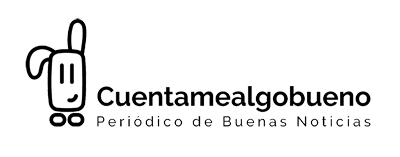
![Lectura de la «Carta de Málaga» durante el NESI Forum 2017 [Vídeo]](https://www.cuentamealgobueno.com/wp-content/uploads/2017/04/20170420-1-lectura-carta-malaga-foro-nesi-2017-08.jpg)
